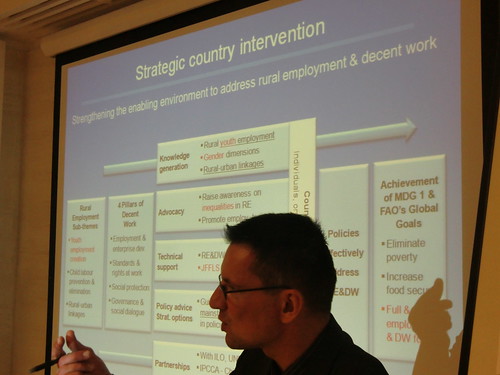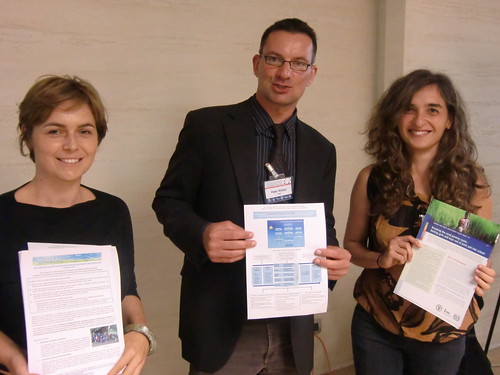FAO is working on an integrated country approach for rural employment and decent work in Malawi and Tanzania aiming to support national capacities in mainstreaming rural employment and decent work; child labour prevention; and youth employment creation. The three-year programme is funded by the Swedish International Development Cooperation Agency (Sida) and supports the Millennium Development Goal 1 on ‘Eradicate Extreme Poverty and Hunger’, under the new target (1B) to achieve full and productive employment and decent work for all, including women and young people.
 Peter Wobst, from FAO, presented the main aspects of the approach, its background, the rationale and its activities, such as child labour prevention in agriculture and junior farmer field and life schools (JFFLS). Peter shared with us the lessons he and his team have learned since the programme started:
Peter Wobst, from FAO, presented the main aspects of the approach, its background, the rationale and its activities, such as child labour prevention in agriculture and junior farmer field and life schools (JFFLS). Peter shared with us the lessons he and his team have learned since the programme started:- Involvement of stakeholders such as national and local government, UN agencies, those active in the area (NGOs), and local communities is crucial for understanding all the issues involved in rural employment.
- Using an integrated approach that better reflect issues on child labour and linking it with other areas of food security, collecting ideas beyond employment.
- Paying attention to context and population groups to have tailored approaches (the reality of employment in fishing communities is different from crop farmers)
- Influencing the formulation of policy and strategies at national and UN level.
- Working through capacity development but need next steps
One participant suggested to avoid the word institutionalization as it can be associated with bureaucracy. And to look at this intervention as a complex systems with multiple dimensions. On the sustainability, working with policy makers on the values of the project, on creation of employment and reducing poverty, can be a way to move towards sustainability, where National governments take the responsibility for carrying on the programme in a near future. Just having policies is not enough, but helping governments to see the importance of such policies and the benefits of applying such policies can bring is the way forward.
Child labour is a sensitive issue but when discussing with national partners, the team linked it with poverty reduction and employment generation.
More information can be found at www.fao-ilo.org.


No comments:
Post a Comment